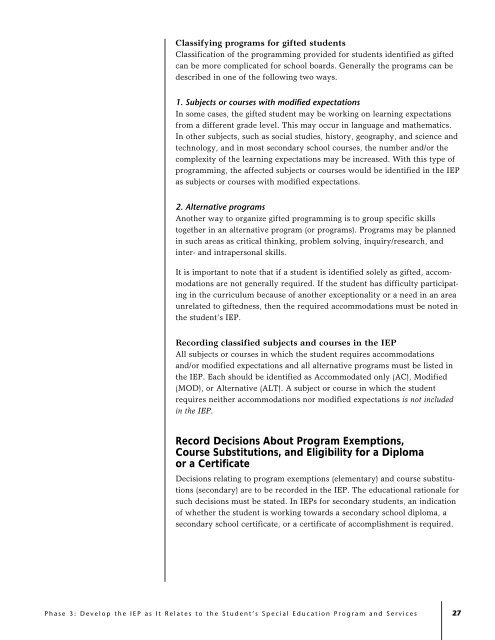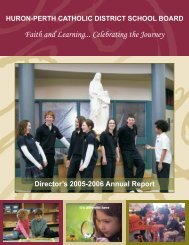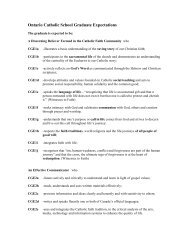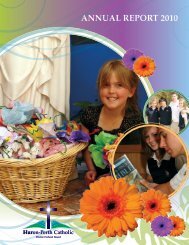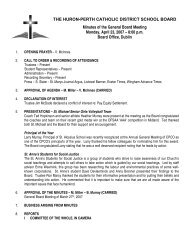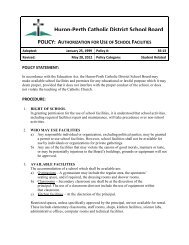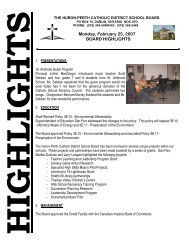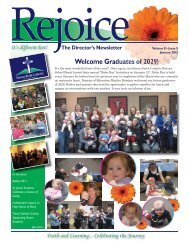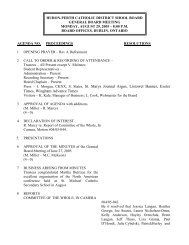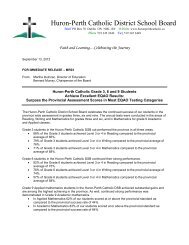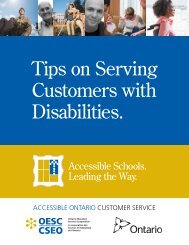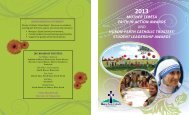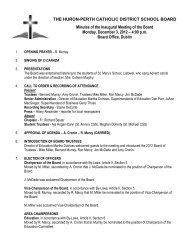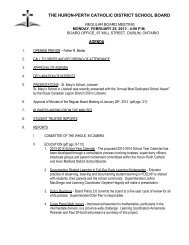The Individual Education Plan (IEP) - A Resource Guide, 2004
The Individual Education Plan (IEP) - A Resource Guide, 2004
The Individual Education Plan (IEP) - A Resource Guide, 2004
Create successful ePaper yourself
Turn your PDF publications into a flip-book with our unique Google optimized e-Paper software.
Classifying programs for gifted students<br />
Classification of the programming provided for students identified as gifted<br />
can be more complicated for school boards. Generally the programs can be<br />
described in one of the following two ways.<br />
1. Subjects or courses with modified expectations<br />
In some cases, the gifted student may be working on learning expectations<br />
from a different grade level. This may occur in language and mathematics.<br />
In other subjects, such as social studies, history, geography, and science and<br />
technology, and in most secondary school courses, the number and/or the<br />
complexity of the learning expectations may be increased. With this type of<br />
programming, the affected subjects or courses would be identified in the <strong>IEP</strong><br />
as subjects or courses with modified expectations.<br />
2. Alternative programs<br />
Another way to organize gifted programming is to group specific skills<br />
together in an alternative program (or programs). Programs may be planned<br />
in such areas as critical thinking, problem solving, inquiry/research, and<br />
inter- and intrapersonal skills.<br />
It is important to note that if a student is identified solely as gifted, accommodations<br />
are not generally required. If the student has difficulty participating<br />
in the curriculum because of another exceptionality or a need in an area<br />
unrelated to giftedness, then the required accommodations must be noted in<br />
the student’s <strong>IEP</strong>.<br />
Recording classified subjects and courses in the <strong>IEP</strong><br />
All subjects or courses in which the student requires accommodations<br />
and/or modified expectations and all alternative programs must be listed in<br />
the <strong>IEP</strong>. Each should be identified as Accommodated only (AC), Modified<br />
(MOD), or Alternative (ALT). A subject or course in which the student<br />
requires neither accommodations nor modified expectations is not included<br />
in the <strong>IEP</strong>.<br />
Record Decisions About Program Exemptions,<br />
Course Substitutions, and Eligibility for a Diploma<br />
or a Certificate<br />
Decisions relating to program exemptions (elementary) and course substitutions<br />
(secondary) are to be recorded in the <strong>IEP</strong>. <strong>The</strong> educational rationale for<br />
such decisions must be stated. In <strong>IEP</strong>s for secondary students, an indication<br />
of whether the student is working towards a secondary school diploma, a<br />
secondary school certificate, or a certificate of accomplishment is required.<br />
Phase 3: Develop the <strong>IEP</strong> as It Relates to the Student’s Special <strong>Education</strong> Program and Services<br />
27


